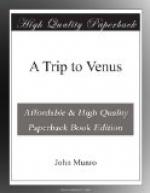At first more attention is paid to the cultivation of the body than the mind. Not only are the boys and girls trained in open-air gymnasia, or contend in games, but they also work in the gardens, and during the holidays are sent into the wilderness under the guidance of their elders, especially their elder brothers, to rough it there in primitive freedom.
The first lessons of the pupil are very short and simple, but as his mind ripens they become longer and more difficult. The education of the soul precedes that of the mind. They wish to make their children good before they make them clever; and good by the feelings of the heart rather than the instruction of the head. Every care is taken to refine and strengthen the sentiments and instincts, the conscience, good sense and taste, as well as the affections, filial piety, friendship, and the love of Nature. Spiritual and moral ideals are inculcated by means of innocent and simple tales or narratives. Children are taught to obey the authority placed over them, or in their own breast, and to sacrifice all to their duty. The conduct of the teacher must be irreproachable, because he is a model to them; but while they look upon him as their friend and guide, he leaves them free to choose their own companions and amuse themselves in their own way.
In the cultivation of the mind they give the first and foremost place to the imagination. The reason, they say, is mechanical, and cannot rise above the known; that is to say, the real; whereas the imagination is creative and attains to the unknown, the ideal. Its highest work is the creation of beauty. Because it is unruly, and precarious in its action, however, the imagination requires the most careful guidance, and the assistance of the reason. Students are taught to idealise and invent, as well as to analyse and reason, but without disturbing the equilibrium of the faculties by acquiring a pronounced habit of one or the other. It is better, they say, to be reasonable than a reasoner; to be imaginative than a dreamer; and to have discernment or insight than mere knowledge.
The most important study of all is the art of living, or in other words the art of leading a simple, noble, and beautiful life. It finishes their education, and consists in the reduction of their highest precepts and ideals to practice. The reasons for every lesson are given so far as they are known, and they are always founded in the nature of things. A pupil is taught to act in a particular way, not in the hope of a reward or in the fear of punishment, but because it would be contrary to the laws of matter and spirit to act otherwise; in short, because it is right. They hold that life is its own end as well as its own reward. According as it is good or bad, so it achieves or fails of its purpose, and is happy or miserable. We are happy by our emotions or feelings, and through these by our actions. Happiness comes from goodness, but is not perfect without health, beauty, and fitness: hence the pupils are taught self-regulation, practical hygiene, and a graceful manner. Indeed, their passion for beauty is such that they regard nothing as perfect until it is beautiful.




